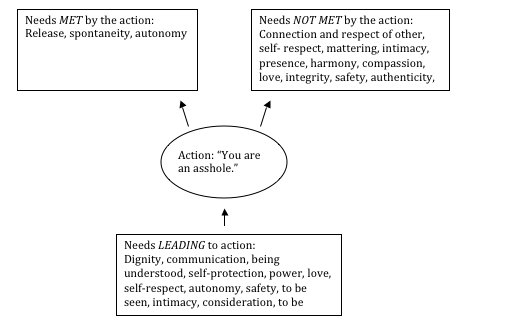
Motivation
Intention and Effect
Too busy protesting innocence of intent to take in the effects of our actions?
Posted August 23, 2013

One of the most common responses when someone expresses upset about our actions is something along the lines of the statement “I didn’t mean to hurt you.” Any of us who have heard this kind of response know how little it offers, and yet we keep doing it. I’ve wondered about this for some time. What is clear to me is that this response shifts the focus from the effect of actions to their intention. At one and the same time, this is also a shift in focus from the person who is upset to the person whose action resulted in the upset. No wonder we don’t feel heard when we get this response!
Our intention and the effect of our actions don’t necessarily line up. In exploring that gap in a variety of contexts, both internal and relational, I hope to support clarity and the possibility of greater personal liberation for many of us.
Privilege and Defensiveness

Recently, I was sitting with a friend at a café. She was telling me why she had been, for a lengthy period, keeping a distance from me. What made this unusual, in my mind, is that she is African-American and I am white, and the reason for her distance had everything to do with this difference between us. In effect, my friend, let’s call her Darcy, was calling me on what she interpreted as white, privileged behavior.
This part of the conversation was far from pleasant. Not all of it was specifically about me and the specific interactions between us. Much of it was overall about being African-American among white people and the extraordinary blindness most of us white people have about the gap in experience between us and about what we do that contributes to an incessant, unremitting stress in the lives of African-Americans (and undoubtedly other groups around us). Still, even during the parts that were not personal about me, the language and the tone that Darcy used had a lot of intensity to them. Moreover, the specific content that was about me involved, to my mind, an interpretation of my actions that didn’t match my own self-understanding. And it went on for quite a while, more than fifteen minutes of Darcy speaking with very few words from me.
I feel enormous gratitude to years and years of practice and commitment to listening and presence. I brought all of it to bear in those moments. I listened intently, with all my heart and mind. I knew that Darcy was making a conscious choice to express all of her pain, confusion, and what she had to go through to regain her willingness to engage with me. I wanted to honor that choice by being committed to listening and learning, listening and learning. Most importantly, I knew that my intention in those moments that she was talking about was not what mattered most. Instead, I wanted to learn about the effect of my actions.
I know enough to be aware that one of the consequences of privilege and social power is that we have less capacity to see the effects of our actions. Privilege, by its nature, protects us from seeing or even having to care about the effect of our actions. This is true for whites in relation to blacks, for men in relation to women, and similarly in many other settings of social divisions. Here’s just one example that haunts me on a daily basis: we, the people of the industrialized north, are shielded from knowing how the availability of our conveniences and comforts at such low cost depends on billions in the global south who are toiling away under conditions none of us would want for them and yet accept implicitly.

Despite being Jewish, despite being an immigrant, despite English not being my first language, I know I have access to white privilege by virtue of my lighter skin. I also knew in the moment of Darcy speaking to me that she was gracing me with her trust by choosing to express it rather than disappear. This knowledge gave me sufficient motivation and strength to keep putting my attention on the effect.
In the past, it would have been difficult even then to stay focused because of the pull to defend myself because my intention had not been seen by her. It took years of discipline, of reminding myself to focus on the effect, on the effect, on the effect, almost like a mantra, in order to overcome the habit of defending, until presence to the effect became a new option.
This pull to defend, to focus on my intention being seen, is, in itself, part of the blindness of privilege. Since privilege masks the effects of our actions on others, we can continue to live with those effects because we don’t know them. Learning about the effect is deeply unsettling, as it calls into question our cherished beliefs about our own human decency.
I was particularly stunned to see this specific form of defensiveness during the first Intifada, while visiting Israel. I was present several times when Palestinians from the Occupied Territories were speaking to Jewish-Israelis during events designed to foster dialogue and mutual understanding. Several times I noticed the same phenomenon. Initially, everyone was listening with a great deal of attention. Then, sooner or later, and always in response to the telling of personal stories of what had been done to the speakers themselves or to members of their families, part of the response from the audience was anger. How could it be that personal stories, which I always think of as bringing people closer to each other, generated anger in response? While I can’t know, my sense is that hearing the personal stories made the Palestinians more human. Since the entire edifice of justifications for the continued war and occupation depends on dehumanizing the Palestinians, everything is suddenly put into question. The effects of the actions that are thought to be only for the protection of people in Israel become visible, and hence unbearable. No one wants to believe that in their name such cruelties are committed. Hence the anger.
I myself am not immune to defensiveness. Like all human beings, I am hungry to have my intentions seen and trusted. This is, in my mind, the root cause of defensiveness, combined with fear of punishment that so many of us carry. In earlier years, conversations about similar topics to what my friend Darcy was bringing up ended poorly, because I was still consumed by having my own innocence seen, and couldn’t make sufficient room for absorbing and mourning the effects of my action, regardless of my intentions. This is no longer the case. I have more presence, more peace about being seen differently from my own self-perception, more willingness, perhaps, to learn and reconsider what my actions meant, more humility overall.
The biggest antidote to defensiveness I am aware of is the cultivation of self-acceptance. I dedicated some years to this practice (see Overcoming Defensiveness), and it has freed me enormously. For this, intention does matter.
Intention and Self-Acceptance
Paradoxically, one of the main reasons why I was as able as I was to be calm and present with Darcy had to do precisely with my own clarity about my intention. I had enough self-acceptance and clarity that I could be free from the concern about how I was being seen by Darcy, and I could therefore focus on the effect, recognizing that no amount of inner clarity about intention would ever be enough to unveil me, free me from the blindness of privilege. No matter what, I would need to learn and integrate something that would allow me, hopefully, to make different choices in the future, choices that are more oriented towards understanding and integrating the effects of my actions on people with less social power.
Just as much as the confusion between intention and effect makes for messy sorting out of pain between people, it also makes for immense difficulty in how we relate to ourselves when we are unhappy with the outcome of our actions. Most of us, most of the time, resort to self-judgment in those moments. Especially when we are dealing with repeated incidents of acting in ways that don’t have the desired effect, we easily get caught in a cycle of judging ourselves that creates misery and doesn’t encourage inner learning or freedom. When the occasion arises again, because we didn’t make any progress with understanding the motivation for our actions, we are more likely than not to keep acting in the same way despite the harsh pressure we put on ourselves to do it differently. The way out, for me, rests, once again, on teasing apart the motivation from the outcome, the intention from the effect. That allows us to shift out of self-judgment and into a combination of mourning the outcome and having compassion for the intention or motivation at the same time.
Here’s an example from a workshop I led a while back. A woman I will call Serena called someone an asshole, and judged herself harshly for this action. After we worked together to unpack the complex internal web of meanings, the following emerged: some needs were met by the action (the square at the top left of the diagram below); some needs, many more, were not met by the action, and some needs were the ones leading to the action.
Part of what makes this distinction so confusing is that often enough we are motivated to take an action as an attempt to meet a need that the action ultimately doesn’t meet. In this example, most of the needs that led to Serena’s choice didn’t feature at all in what needs were met or not met, and some of the needs that led her to the action specifically showed up on the “unmet needs” list we created.
If we build our relationship within only on what needs were met or not met by the action, we lose the rich field of meaning that arises from recognizing that even if our needs were not met, our motivation is still fully human and understandable. This is precisely the tension I was holding internally while listening to Darcy. I knew well enough my own humanity, and held it with enough tenderness, that there was room within and on top of that softness to feel the wrenching sadness of what Darcy experienced without having to make myself wrong in the process.
Being able to hold both ends of the equation at once is key to our inner well-being, which to me includes continuing to learn and to free myself ever more fully. I love the beauty that makes that very same ability also pivotal in creating understanding and reconciliation between people and groups.
I invite anyone reading this blog to look at this diagram, and to apply it to actions of your own as you become more able to mourn and self-accept as you move through life, thereby becoming more present for others when your actions affect them negatively.

A Lesson in Interdependence
One missing piece in this discussion is whether or not there is a relationship between intention and effect. I have found tremendous freedom in the assertion that other people’s actions don’t cause our feelings; that they are only a stimulus. The freedom lay in recognizing that my inner experience is created by the meaning that I assign to the action. If I am the one who generates the meaning, then I have the power to change the meaning, and with it the experience that I have. How can I change the meaning? What alternate meaning can I assign to an action that has a painful effect on me? The answer came from another core assumptions that I first heard from Marshall Rosenberg and subsequently made fully my own: that everything that any human being ever does is an attempt to meet a human need that is common to all of us.
Whenever anyone does something that affects me or others negatively, I have the freedom now to look for and identify a possible human need or several that could have motivated this person to do what they did. I have never yet encountered a situation, however horrific the consequences, that didn’t lend itself to that re-interpretation. I have always been able to find a human need at the root of the action that was also a need of mine. This doesn’t mean I begin to like the action, or that I wouldn’t, in some instances, do everything in my power to stop people from taking certain actions. What changes is my inner experience, specifically, the pain that comes from seeing people as inhuman.
All of that said, I still want to know more about the relationship between one person’s action and the effect that it had on another person. If we don’t cause the feelings or experience of another person, does this mean we bear no responsibility whatsoever for what happens to them? I have, alas, seen people disengage from a person who is upset with them by claiming that this person’s upset is all their own doing. Not my idea of what interdependence means.
What I have come to believe is that between cause and random occurrence there is an entire complex relationship for which I don’t have a word, I don’t believe it exists in the language. Perhaps the closest thing to it would be to define it as a culturally-specific set of probabilities about how a certain action will affect others. As a simple example, it is extremely unlikely that someone will speak in anger and another person will take it to mean an expression of great satisfaction and loving joy… What we do, and the culture and context within which we do it, constrain the possible meanings that someone else can assign to our action. We don’t interpret things in a vacuum.
This brings me back to why I was listening to Darcy so intently. Darcy was telling me something of vital importance about an entire area to which I was blind: how certain actions of white people, in some contexts, affect African-Americans. In a very particular and specific way, I acted in ways that didn’t include the potential effect. Now that I know the likely interpretation of certain actions, I can no longer hide comfortably within my privileged innocence. I hope so much that I will have the capacity to integrate this knowledge and let it affect my own choices of how to act in the world, that I can expand my intention, to being with, to include the effect, to include learning and considering what I am doing from a different vantage point than my own insular and internal one. Interdependence, for me, means that all our actions affect others in ways we don’t know, and that I want to learn more and more about these effects. This is the only hope I have for learning how I can line my own actions ever more fully with my desire to hold everyone’s needs with care.
Credit: “I never meant to hurt you” by xiaohime23
Click here to read the Questions about this post, and to join us to discuss them on a conference call next Tuesday, August 27, 5:30-7 pm Pacific time. This is a way that you can connect with me and others who read this blog.We are asking for $30 to join the call, on a gift economy basis: so pay more or less (or nothing) as you are able and willing.



